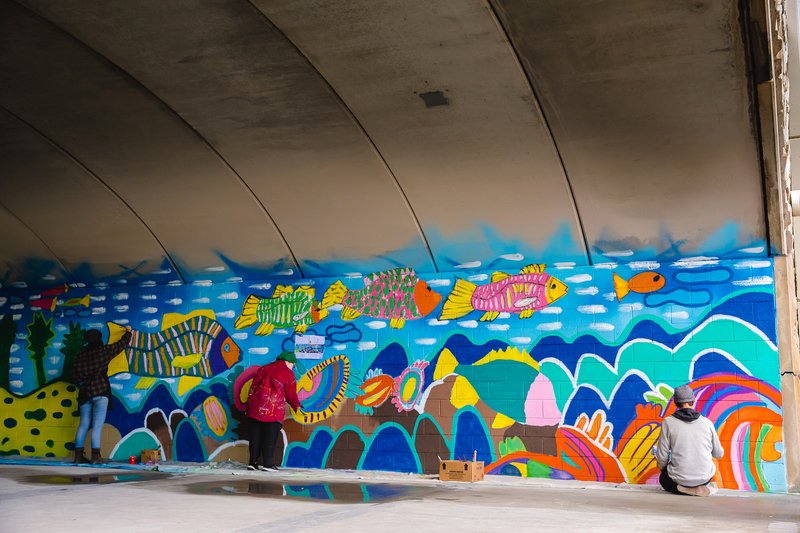22 October 2020: Our chance to change public perception of the arts
The closing date for submissions to the Inquiry into Australia’s creative and cultural industries and institutions is 22 October 2020.
The closing date for submissions to the Inquiry into Australia’s creative and cultural industries and institutions is 22 October 2020.

Image: Studio A artist, Emily Crockford working on her Oysters Eating Rainbows mural in the Karingal underpass, Kingsgrove NSW as part of Canal to Creek: WestConnex New M5 public art program, curated by Cultural Capital. Photo by Document Photography 2020.
As well as reading and considering the feedback from you in the recent NAVA Survey, I’ve been having many conversations and listening to talks and discussions as NAVA is undergoing strategic planning, a major revision of the Code of Practice, preparing its submission for the inquiry into the arts and recently completed an 18-month advocacy workshop program that culminated in Arts Day on the Hill. Increasingly I am hearing from Members, sector colleagues and MPs about the urgent need to change the public perception of the arts. When I say that, I mean the stereotypical public perception - the one that’s stuck in the conservative media, and more dangerously, the one that our politicians hear about the most.
Of course there’s been loads of research and reports released in the last few years that demonstrate the broad public perception of the arts and its value to Australians is actually quite high, and continues to grow. We have the economic data that demonstrates the huge value of the arts in dollar terms. We have the visitation data that shows just how many people attend the arts. Again, it’s huge. We have people crunching the data, formatting it into tables and charts, and making it available for us to use and refer to. What we don’t have is enough people telling the story. That’s what’s missing.
Art can make us happy and feel a spectrum of other emotions. Art can provide important distractions and entertainment. Art can decorate a space, improve our health, or lift a mood. Art can also educate, inspire, and communicate ideas. Art helps us see things from other perspectives and challenge the status quo. Artists influence every aspect of our lives and the way we view ourselves as individuals and as a nation.
This year has really demonstrated just how precarious everything is in the arts. Precarious because we’re not seen to be important by the people who make the policy decisions that have impact on our lives. The arts industry is genuinely in a position that we haven’t been in for a long time. As the recession starts to dig in, all levels of government are going to cut spending. "Elite", "inaccessible", "indulgent", "expensive", "non-essential". This is the language that needs to be reframed so the arts do not bear the brunt of further unbalanced budget cuts and debilitating policy change. We need to enhance the narrative and change the stereotypical perception – change the optics. We have to cut through the perception of the arts as non-essential. Because it is essential. This is an industry. This is a job. This is our lives. We urgently need a creative and cultural policy that’s ambitious and fair – because without it, we risk losing culture, talent, jobs, and the local economies they power.
The highly visible advocacy work and increased collegiately across the sector during this pandemic has opened a door to conversation with the Australian Government. It’s now really important that we wedge that door and open it wider. The Inquiry into Australia’s creative and cultural industries and institutions is one opportunity we have this month to do exactly that. As well as questions about the benefit and value of the arts, and the impact of Covid-19 on our industry, the inquiry is also calling for recommendations for growth, cooperation and innovation. The arts are really good at imagining, looking forward and speculating futures. It’s what we do.
Certainly institutionalised art has historically excluded those who do not possess certain educations, languages, histories, bodies. There’s a great deal more work for us to do to break down the internal elitisms and structural inequities, and improve accessibility and fairness across the sector. For those who feel dissatisfied with the arts - for perhaps not meeting community needs nor responding to current urgencies - it is important to recognise that the solution is not to defund the arts ecology but to engage with it, nurture it, transform it. Let's collectively speculate how the arts can both serve and inspire our communities in times of crisis - and also push for policy and funding that will make this vision possible.
Five years ago, over 2,260 submissions from around the country and overseas were received for the Inquiry into the impact of budget decisions on the arts. Let’s again put pen to paper, or fingers to keyboard, and provide the impetus for the Government to recognise how essential the arts are to us. To you. It’s time again for us to come out in numbers. Share our stories and make recommendations. The deadline is 22 October 2020 and there are plenty of articles and research papers online to help you articulate your case. We've put together a handful for you (see link below).
Some good things have to come out of this. Let’s use this time and let’s use the momentum for change.
NAVA encourages artists, arts workers, audiences and friends to add your voice, detailing the benefits the arts bring to Australia, and the significant impacts that COVID-19 has had on our industry.
Questions
How to contribute
Upload your submission to the inquiry page and or complete the survey below.
The links below include NAVA's guide on writing submissions to an inquiry and a reference list of recent and relevant arts sector research to assist in the building of your case.